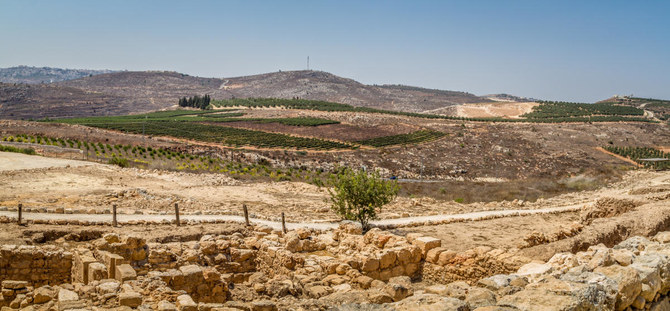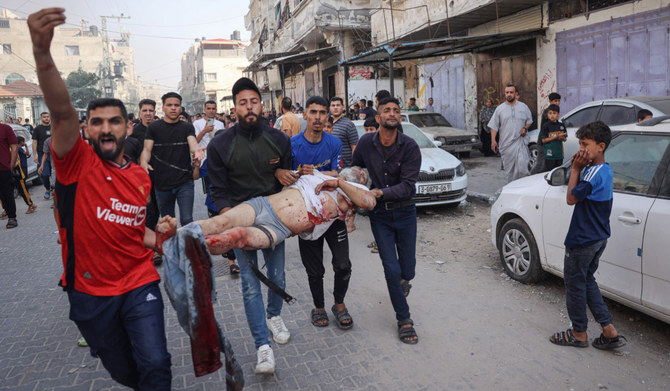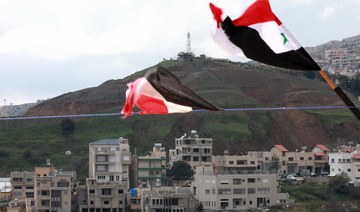SHILOH, WEST BANK: Deep in the West Bank, Israeli settlers have transformed an archaeological site into a biblical tourist attraction that attracts tens of thousands of evangelical Christians each year.
Tel Shiloh is believed to have been the site of the biblical tabernacle, but not everyone is pleased at how the ruins are presented to visitors.
Like many Holy Land sites, Tel Shiloh sits at the confluence of competing narratives of archaeology, religion, and nationalism. Critics say the site promotes a narrow interpretation of history popular with Israeli settlers and their Christian supporters.
The hilltop mound, 30 kilometres north of Jerusalem in the Israeli-occupied West Bank, has been excavated by several archaeological missions, starting in 1922, and has yielded remains spanning over 3,700 years.
For centuries, Jews, Muslims, and Christians have associated the site with the home of the biblical tabernacle, the portable shrine where the Israelites housed the Ark of the Covenant.
Because of its biblical significance, the archaeological ruins have become a pilgrimage site for evangelical Christians.
Last week, Prime Minister Benjamin Netanyahu visited Tel Shiloh with former Arkansas Gov. Mike Huckabee and settler leaders, calling it Israel’s “first capital.”
Huckabee, a television host with a strong evangelical following, tweeted that “Shiloh is proof from 3000 yrs ago this land was home to @Israel site of ancient Tabernacle.”
In 2009, Tel Shiloh hosted 30,000 visitors, 60 percent of whom identified as evangelical Christians, according to the Israeli government. In 2012, the government allocated about $4.2 million for a plan to preserve and upgrade the site, inaugurating a new visitors’ centre the following year.
Since its completion, Tel Shiloh — rebranded as Ancient Shiloh: City of the Tabernacle — has seen tourism skyrocket to around 120,000 visitors in 2018, said site director Lilyan Zaitman. Over half were evangelical Christians.
Unlike other major sites in the West Bank, Tel Shiloh is managed by the local settler council and Mishkan Shiloh, a private non-profit organization, rather than Israel’s Nature and Parks Authority.
The site is inside the Jewish settlement of Shiloh, founded after Israel captured the West Bank in the 1967 war. The tourist attraction is built on private Palestinian land but Palestinians are barred from entering, according to a recent Amnesty International report.
The Palestinians have demanded the West Bank as part of their future state, and most of the international community views the settlements as illegal.
The Second Protocol of the Hague Convention for the protection of cultural property prohibits archaeological excavations in occupied territory “save where this is strictly required to safeguard, record or preserve cultural property.” Israel is not one of the protocol’s 82 signatories.
Zaitman said visitors should understand that “the roots of the Jewish people began here,” calling it “the first capital city of the Jewish people before Jerusalem.”
Despite Tel Shiloh’s long and varied history, the site drives home its Jewish relevance, with little attention paid to other periods or peoples, whether Canaanite, Byzantine or Muslim. This has drawn criticism from archaeologists and activists.
Emek Shaveh and Yesh Din, Israeli NGOs, charged in a 2017 report on Israeli archaeology in the West Bank that Ancient Shiloh aims to “reinforce the connection between the biblical Shiloh and the modern settlement, in a manner not necessarily based on the archaeological discoveries at the site.”
The goal, they argue, is to “create a broad consensus about its importance as an indivisible part of the state of Israel.”
Among the ruins are three Byzantine-era churches and two mosques. One of the two historical mosques is located outside the archaeological park, while the second is unmarked and undeveloped for visitors. A Byzantine church has been reconstructed and serves as a venue for events.
A new three-dimensional “hologram” presentation entertains viewers with a representation of the tabernacle and a description of the rituals performed there, based on the Bible.
A small museum inside the visitors’ centre makes scant mention of nearly 1,400 years of Muslim rule, and a film depicting the site’s history deals exclusively with the biblical account.
The archaeological record, however, is more complicated.
Tel Aviv University archaeologist Israel Finkelstein led excavations at Tel Shiloh in the 1980s. He said there is evidence of continuous religious activity at the site for centuries leading up to the early Iron Age, the period associated with the emergence of the ancient Israelites.
“What exactly was the nature of the cult, whether there was a temple there, and also the exact location of this cult place at the site, is not very clear,” Finkelstein said. As with any archaeological site, Finkelstein said “our responsibility is to give the facts, and then we can of course say that there is more than one way to interpret the finds.”
No evidence of the tabernacle has been found, but archaeologists are looking. Excavations are being carried out by the Associates for Biblical Research, whose stated aim is “demonstrating the historical reliability of the Bible through archaeological and biblical research.”
Scott Stripling, head of the current excavation, is one of a handful of evangelical archaeologists currently excavating in the West Bank. Evangelicals are the only non-Israeli teams involved in West Bank digs. Except for Tel Shiloh, however, the others operate in conjunction with Israeli universities.
“We will likely be the largest excavation in Israel once again this summer,” Stripling said. Despite broad academic stigma involved with excavating in the West Bank, Stripling said his organization “is completely apolitical, and we would be excavating the same region, regardless of political changes.”
Rico Cortes, a tour guide from Orlando, Florida, who led a Spanish-speaking group through the site earlier this month, said Shiloh’s connection to the state of Israel is unquestioned.
“I bring everyone to respect Israel, the people and the Book,” he said. “The fact that the presence of God one time dwelled here is overwhelming.”
Ancient West Bank site draws Christians, and controversy
Ancient West Bank site draws Christians, and controversy

- Some people believe the portrayal of the site supports the Israeli narrative of history
- The biblical significance of the site makes it a pilgrimage location for evangelical Christians
Israel attacks Rafah after Hamas claims responsibility for deadly rocket attack

- Israel has killed more than 34,600 Palestinians, according to Gaza’s Health Ministry
CAIRO: Three Israeli soldiers were killed in a rocket attack claimed by Hamas armed wing, near the southern Gaza Strip city of Rafah, where Palestinian health officials said at least 19 people were killed by Israeli fire on Sunday.
Hamas's armed wing claimed responsibility on Sunday for an attack on the Kerem Shalom crossing into Gaza that Israel said killed three of its soldiers.
Israel's military said 10 projectiles were launched from Rafah in southern Gaza towards the area of the crossing, which it said was now closed to aid trucks going into the coastal enclave. Other crossings remained open.
Hamas' armed wing said it fired rockets at an Israeli army base by the crossing, but did not confirm where it fired them from. Hamas media quoted a source close to the group as saying the commercial crossing was not the target.
More than a million Palestinians are sheltering in Rafah, near the border with Egypt.
Shortly after the Hamas attack, an Israeli airstrike hit a house in Rafah killing three people and wounding several others, Palestinian medics said.
The Israeli military confirmed the counter-strike, saying it struck the launcher from which the Hamas projectiles were fired, as well as a nearby "military structure".
"The launches carried out by Hamas adjacent to the Rafah Crossing ... are a clear example of the terrorist organisation's systematic exploitation of humanitarian facilities and spaces, and their continued use of the Gazan civilian population as human shields," it said.
Hamas denies it uses civilians as human shields.
Just before midnight, an Israeli air strike killed nine Palestinians, including a baby, in another house in Rafah, Gaza health officials said. They said the new strike increased the death toll on Sunday to at least 19 people.
Israel has vowed to enter the southern Gaza city and flush out Hamas forces there, but has faced mounting pressure to hold fire as the operation could derail fragile humanitarian efforts in Gaza and endanger many more lives.
Sunday's attack on the crossing came as hopes dimmed for ceasefire talks under way in Cairo.
The war began after Hamas stunned Israel with a cross-border raid on Oct. 7 in which 1,200 people were killed and 252 hostages taken, according to Israeli tallies.
More than 34,600 Palestinians have been killed, 29 of them in the past 24 hours, and more than 77,000 have been wounded in Israel's assault, according to Gaza's health ministry.
Netanyahu uses Holocaust ceremony to brush off international pressure against Gaza offensive

- The ceremony ushered in Israel’s first Holocaust remembrance day since the Oct. 7 Hamas attack that sparked the war, imbuing the already somber day with additional meaning
JERUSALEM: Israeli Prime Minister Benjamin Netanyahu on Sunday rejected international pressure to halt the war in Gaza in a fiery speech marking the country’s annual Holocaust memorial day, declaring: “If Israel is forced to stand alone, Israel will stand alone.”
The message, delivered in a setting that typically avoids politics, was aimed at the growing chorus of world leaders who have criticized the heavy toll caused by Israel’s military offensive against Hamas militants and have urged the sides to agree to a ceasefire.
Netanyahu has said he is open to a deal that would pause nearly seven months of fighting and bring home hostages held by Hamas. But he also says he remains committed to an invasion of the southern Gaza city of Rafah, despite widespread international opposition because of the more than 1 million civilians huddled there.
“I say to the leaders of the world: No amount of pressure, no decision by any international forum will stop Israel from defending itself,” he said, speaking in English. “Never again is now.”
Yom Hashoah, the day Israel observes as a memorial for the 6 million Jews killed by Nazi Germany and its allies in the Holocaust, is one of the most solemn dates on the country’s calendar. Speeches at the ceremony generally avoid politics, though Netanyahu in recent years has used the occasion to lash out at Israel’s archenemy Iran.
The ceremony ushered in Israel’s first Holocaust remembrance day since the Oct. 7 Hamas attack that sparked the war, imbuing the already somber day with additional meaning.
Hamas militants killed some 1,200 people in the attack, making it the deadliest violence against Jews since the Holocaust.
Israel responded with an air and ground offensive in Gaza, where the death toll has soared to more than 34,500 people, according to local health officials, and about 80 percent of Gaza’s 2.3 million people are displaced. The death and destruction has prompted South Africa to file a genocide case against Israel in the UN’s world court. Israel strongly rejects the charges.
On Sunday, Netanyahu attacked those accusing Israel of carrying out a genocide against the Palestinians, claiming that Israel was doing everything possible to ensure the entry of humanitarian aid to the Gaza Strip.
The 24-hour memorial period began after sundown on Sunday with a ceremony at Yad Vashem, Israel’s national Holocaust memorial, in Jerusalem.
There are approximately 245,000 living Holocaust survivors around the world, according to the Claims Conference, an organization that negotiates for material compensation for Holocaust survivors. Approximately half of the survivors live in Israel.
On Sunday, Tel Aviv University and the Anti-Defamation League released an annual Antisemitism Worldwide Report for 2023, which found a sharp increase in antisemitic attacks globally.
It said the number of antisemitic incidents in the United States doubled, from 3,697 in 2022 to 7,523 in 2023.
While most of these incidents occurred after the war erupted in October, the number of antisemitic incidents, which include vandalism, harassment, assault, and bomb threats, from January to September was already significantly higher than the previous year.
The report found an average of three bomb threats per day at synagogues and Jewish institutions in the US, more than 10 times the number in 2022.
Other countries tracked similar rises in antisemitic incidents. In France, the number nearly quadrupled, from 436 in 2022 to 1,676 in 2023, while it more than doubled in the United Kingdom and Canada.
“In the aftermath of the October 7 war crimes committed by Hamas, the world has seen the worst wave of antisemitic incidents since the end of the Second World War,” the report stated.
Netanyahu also compared the recent wave of protests on American campuses to German universities in the 1930s, in the runup to the Holocaust. He condemned the “explosion of a volcano of antisemitism spitting out boiling lava of lies against us around the world.”
Nearly 2,500 students have been arrested in a wave of protests at US college campuses, while there have been smaller protests in other countries, including France. Protesters reject antisemitism accusations and say they are criticizing Israel. Campuses and the federal government are struggling to define exactly where political speech crosses into antisemitism.
Hezbollah fires rockets at Israel after south Lebanon strike kills 4 members of family

- Shells fall on Kiryat Shmona and reach northern Golan
- Maronite Patriarch Bechara Al-Rahi calls for end to war in southern Lebanon
BEIRUT: An Israeli airstrike killed four members of a family in a border village in southern Lebanon on Sunday, security sources said.
Hezbollah, in retaliation, fired Katyusha rockets at the northern Israeli town of Kiryat Shmona, close to the Lebanese border.
The four family members killed in Mays Al-Jabal were identified as Fadi Hounaikah and Maya Ali Ammar, and their sons Mohammed, 21, and Ahmad, 12.
The attack occurred when the family took advantage of a de-escalation of hostilities between Hezbollah and Israel to return to their properties to assess damage and move goods from their supermarket to a location outside the village.

A security source in the area told Arab News that while the family was gathering their groceries from the supermarket, an Israeli military drone spotted them and launched an attack, destroying the area and killing all the members of the family and injuring several civilians in the vicinity.
The source clarified that villages in the area were empty because “residents fled the area seven months ago.”
He added: “When residents want to enter these villages to attend victims’ funerals, they send their names and car number plates to the Lebanese Army and UNIFIL, who in turn coordinate with the Israeli side to spare these funerals (from attack).
“In general, people cannot enter border villages without taking into consideration the Israeli danger, as Israeli reconnaissance planes and drones are hovering over the area 24/7. However, what Israel committed against this family is a terrible massacre.”
Hezbollah responded to the incident by launching dozens of Katyusha and Falaq missiles at Israel. The group said the operation was “in response to the crime committed by Israel in the Mays Al-Jabal village.”
The Israeli Upper Galilee Regional Council announced that missiles hit buildings in Kiryat Shmona, while Israeli Army Radio reported that some of the rockets fell inside the city, causing a power outage.
An Israeli army spokesman reported that 65 rockets were launched from southern Lebanon toward Israeli settlements in the Upper Galilee region.
Meanwhile, Israeli airstrikes hit the villages of Al-Adissa and Kafr Kila, while artillery shelling hit the village of Aitaroun.
Maronite Patriarch Bechara Al-Rahi in his Sunday sermon called for an end to the war in southern Lebanon, urging an end to the “demolition of homes, the destruction of shops, the burning of the land and its crops, and the killing and displacement of innocent civilians and the destruction of their livelihood in an economic condition that has already impoverished them.”
Mohammed Raad, leader of Hezbollah’s parliamentary bloc, meanwhile, expressed his disapproval of the West’s backing for Israel.
He said that Israel “faces no international deterrent. On the contrary, some support it in committing crimes.”
He accused those who support Israel of being “hypocrites and liars who falsely claim to champion human rights, civilization, and progress in the West, (yet) they provide Israel with financial aid, weapons, smart bombs, and a continuous air bridge.”
Raad concluded: “We are not afraid of Israel’s insanity. We are prepared to confront them directly. We are prepared to sacrifice and shed blood to protect our homeland, independence, and honor.”
UNRWA chief says again barred entry to Gaza by Israel

- “Just this week, they have denied — for the second time — my entry to Gaza where I planned to be with our UNRWA colleagues including those on the front lines”: Lazzarini
JERUSALEM: The head of the UN agency for Palestinian refugees, UNRWA, said Sunday that Israeli authorities had barred him from entering Gaza for a second time since the Israel-Hamas war started on October 7.
“Just this week, they have denied — for the second time — my entry to Gaza where I planned to be with our UNRWA colleagues including those on the front lines,” Philippe Lazzarini wrote on X, formerly Twitter.
Lazzarini has been to Gaza four times since the war broke out including on March 17.
“The Israeli authorities continue to deny humanitarian access to the United Nations,” he said on Sunday.
“Only in the past two weeks, we have recorded 10 incidents involving shooting at convoys, arrests of UN staff including bullying, stripping them naked, threats with arms & long delays at checkpoints forcing convoys to move during the dark or abort,” Lazzarini said.
He also called for an “independent investigation” into rocket fire that led to the closure of a key Israel-Gaza aid crossing.
Hamas’s armed wing, Ezzedine Al-Qassam Brigades, claimed responsibility for the Sunday launch, saying militants had targeted Israeli troops in the area of Kerem Shalom crossing.
Houthis claim Red Sea victory against US Navy

- Militia forces lack technical or military capability to achieve their objectives in the Mediterranean, analyst says
AL-MUKALLA: The Houthis have reiterated a warning of strikes against ships bound for or with links to Israel — including those in the Mediterranean — as they claimed victory against the US Navy in the Red Sea.
The Houthi-controlled SABA news agency reported that the fourth phase of the militia’s pro-Palestine campaign would involve targeting all ships en route to Israel that came within range of their drones and missiles, noting that the US, UK, and other Western navies “stood helpless” in the face of their attacks.
“The fourth phase demonstrates the striking strength of the Yemeni armed forces in battling the world’s most potent naval weaponry, the American, British and European fleets, as well as the Zionist (Israel) navy,” SABA said.
Houthi military spokesman Yahya Sarea said on Friday strikes against Israel-linked ships would be expanded to the Mediterranean. Attacks would be escalated to include any companies interacting with Israel if the country carried out its planned attack on the Palestinian Rafah.
Since November, the Houthis have launched hundreds of ballistic missiles and drones at commercial and navy vessels in the Red Sea, Bab Al-Mandab Strait and the Gulf of Aden. They claim attacks are only aimed at ships linked with Israel in a bid to force an end to its siege on the Gaza Strip.
They have also fired at US and UK commercial and navy ships in international waters off Yemen after the two countries launched strikes against Houthi-controlled areas.
On Saturday, Houthi information minister Dhaif Allah Al-Shami claimed the US was forced to withdraw its aircraft carrier and other naval ships from the Red Sea after failing to counteract attacks. He added new offensives would begin against Israeli ships in the Mediterranean in the coming days.
“They failed badly. Yemeni missiles and drones beat the US Navy, and its military, cruisers, destroyers and aircraft carriers started to retreat from our seas,” Al-Shami said in an interview with Lebanon’s Al-Mayadeen TV news channel.
Yemen specialists have disputed Houthi assertions that they have military weapons capable of reaching Israeli ships in the Mediterranean.
Brig. Gen. Mohammed Al-Kumaim, a Yemeni military analyst, told Arab News on Sunday the Houthis would only be able to carry out such attacks if they had advanced weaponry. He said the Houthis were expanding their campaign against ships to avoid growing public resentment in areas under their control after the militia had failed to pay public employees and repair services.
Al-Kumaim added the Houthis might claim responsibility for an attack on a ship in the Mediterranean which was carried out by an Iran-backed group operating in the region.
“Theoretically and technologically, the Houthis lack any technical or military capability to achieve their objectives (in the Mediterranean),” Al-Kumaim said.



















